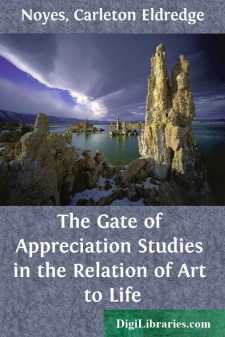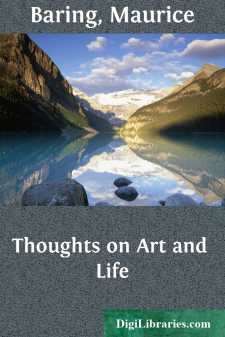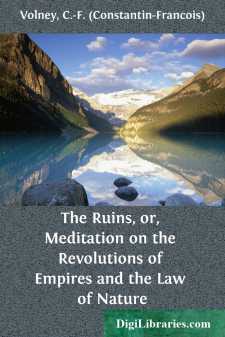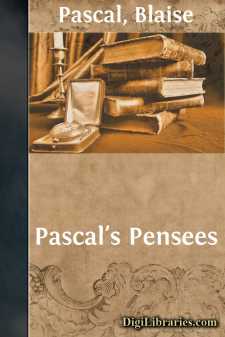Philosophy
- Aesthetics 11
- Eastern 1
- Ethics & Moral Philosophy 3
- General 30
- Hindu 2
- History & Surveys 3
- Logic 1
- Metaphysics 3
- Political 1
- Religious 8
- Social 3
- Taoist 1
Philosophy Books
Sort by:
PREFACE IN the daily life of the ordinary man, a life crowded with diverse interests and increasingly complex demands, some few moments of a busy week or month or year are accorded to an interest in art. Whatever may be his vocation, the man feels instinctively that in his total scheme of life books, pictures, music have somewhere a place. In his own business or profession he is an expert, a man of...
more...
by:
Maurice Baring
INTRODUCTION he long obscurity of the Dark Ages lifted over Italy, awakening to a national though a divided consciousness. Already two distinct tendencies were apparent. The practical and rational, on the one hand, was soon to be outwardly reflected in the burgher-life of Florence and the Lombard cities, while at Rome it had even then created the civil organization of the curia. The novella was its...
more...
INTRODUCTION. The special subject of the greater part of the letters and essays of Schiller contained in this volume is Aesthetics; and before passing to any remarks on his treatment of the subject it will be useful to offer a few observations on the nature of this topic, and on its treatment by the philosophical spirit of different ages. First, then, aesthetics has for its object the vast realm of the...
more...
PARIS TRANSLATION, First published in this Country by Dixon and Sickels.INVOCATION.Hail, solitary ruins! holy sepulchres, and silent walls! you I invoke; to you I address my prayer. While your aspect averts, with secret terror, the vulgar regard, it excites in my heart the charm of delicious sentiments—sublime contemplations. What useful lessons! what affecting and profound reflections you suggest to...
more...
by:
Vernon Lee
THE USE OF BEAUTY. I. One afternoon, in Rome, on the way back from the Aventine, the road-mender climbed onto the tram as it trotted slowly along, and fastened to its front, alongside of the place of the driver, a bough of budding bay. Might one not search long for a better symbol of what we may all do by our life? Bleakness, wind, squalid streets, a car full of heterogeneous people, some very dull,...
more...
by:
Samuel Butler
CHAPTER I: UPS AND DOWNS OF FORTUNE—MY FATHER STARTS FOR EREWHON Before telling the story of my father’s second visit to the remarkable country which he discovered now some thirty years since, I should perhaps say a few words about his career between the publication of his book in 1872, and his death in the early summer of 1891. I shall thus touch briefly on the causes that occasioned his failure...
more...
by:
John Armstrong
INTRODUCTION The essays on taste taken from the work of John Gilbert Cooper and John Armstrong and reprinted in this issue are of interest and value to the student of the eighteenth century because they typify the shifting attitudes toward taste held by most mid-century poets and critics. Cooper, who accepts the Shaftesbury-Hutchesonian thesis of the internal sense, emphasizes the personal, ecstatic...
more...
PREFACE The following pages are the answer to questions which a young man asked himself when, fresh from the university, he found himself adrift in the great galleries of Europe. As he stood helpless and confused in the presence of the visible expressions of the spirit of man in so many ages and so many lands, one question recurred insistently: Why are these pictures? What is the meaning of all this...
more...
by:
Ibn Tufail
THE PREFACE. When Mr. Pococke first publish'd this Arabick Author with his accurate Latin Version, Anno 1671. Dr. Pococke his Father, that late eminent Professor of the Oriental Languages in the University of Oxford, prefix'd a Preface to it; in which he tells us, that he has good Reason to think, that this Author was contemporary with Averroes, who died very ancient in the Year of the Hegira...
more...
by:
Blaise Pascal
INTRODUCTION It might seem that about Blaise Pascal, and about the two works on which his fame is founded, everything that there is to say had been said. The details of his life are as fully known as we can expect to know them; his mathematical and physical discoveries have been treated many times; his religious sentiment and his theological views have been discussed again and again; and his prose...
more...











